The traditional naming ceremony in Kumasi holds profound cultural significance for those of African descent, providing a vital connection to their ancestral roots. Celebrated soon after a child’s birth, the vibrant event features captivating attire, including stunning kente fabric and traditional garments, which symbolize Ghanaian identity. Participants engage in rich practices that link names to unique qualities and birth circumstances, fostering an emotional bond with their heritage. While the ceremony’s warmth and lasting impact garner heartfelt testimonials, the full experience extends beyond the ceremony itself, inviting visitors to explore the region’s cocoa farms and kente weaving workshops.
Key Points
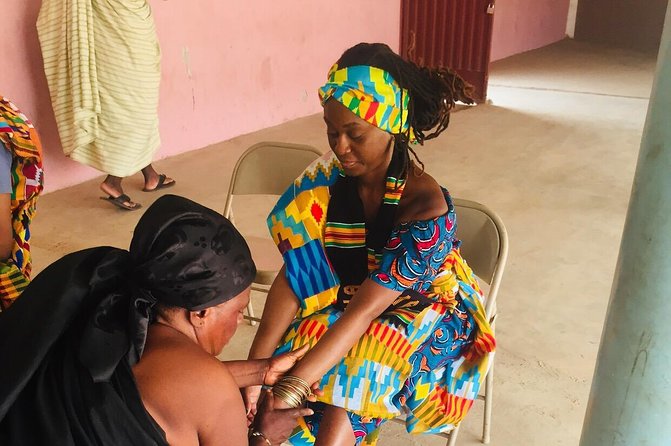
- The traditional naming ceremony in Kumasi, Ghana, is a cherished cultural rite that connects newborn children to their ancestral roots.
- Participants can experience the ceremony’s significance, which includes wearing colorful Ghanaian attire, visiting a cocoa farm, and learning about kente weaving.
- The ceremony provides an opportunity to immerse in the rich cultural heritage of Ghana, including the history and traditions behind the naming process.
- The experience is accessible for travelers with diverse needs, with wheelchair-friendly transportation and infant seats available.
- Traveler testimonials highlight the emotional significance and culture of the naming ceremony, with high praise for the knowledgeable and welcoming guides.
Significance of the Naming Ceremony
The traditional naming ceremony holds deep cultural significance for the Ghanaian people, marking a crucial milestone in the life of a newborn child. This private ritual, usually held within days of birth, is an integral part of the country’s rich heritage.
The child is bestowed with a traditional name based on their birth date, linking them to their ancestral roots and the Ghanaian community. The ceremony is a cherished tradition, particularly for African-American and Caribbean diasporas, who can participate in the experience with the Adawomase tribe in Kumasi.
You can also read our reviews of more tours and experiences in Kumasi.
Preparation and Cultural Attire
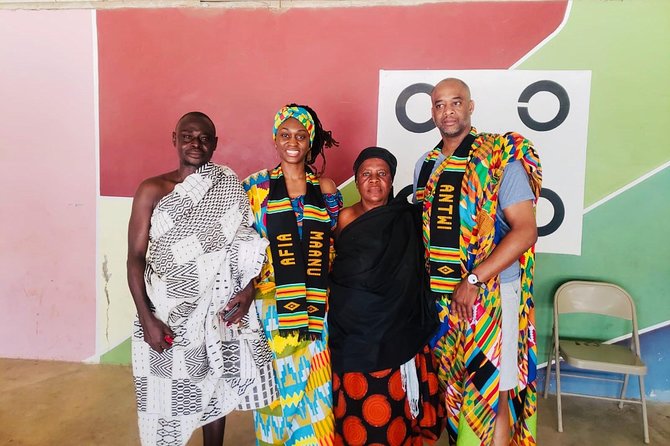
As part of the traditional naming ceremony, participants don colorful Ghanaian cloth and apparel to immerse themselves fully in the cultural experience.
The vibrant kente fabric, intricate beadwork, and traditional adornments transport visitors to the heart of Ghanaian heritage.
Women might wear a vibrant wraparound skirt called a ‘kaba’ and a matching headwrap, while men don the iconic kente-patterned robes.
Participants also receive a symbolic necklace or bracelet as part of the ceremony.
This cultural attire allows everyone to feel connected to the centuries-old traditions being honored.
Visiting the Cocoa Farm
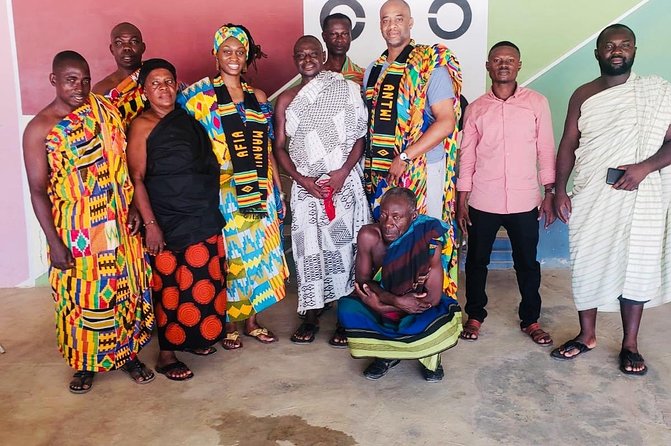
Participants visit a nearby cocoa farm, where they learn about the cultivation and processing of this essential ingredient in Ghana’s economy. They see firsthand how the cocoa pods are harvested from the trees, fermented, and dried. The experience provides an appreciation for the hard work and care required to produce the cocoa beans that are vital to Ghana’s position as one of the world’s largest cocoa producers.
The visit highlights:
-
The manual labor involved in cocoa farming
-
The critical role of fermentation and drying in cocoa bean processing
-
How cocoa has shaped Ghana’s agricultural landscape and economy
Kente Weaving Workshop
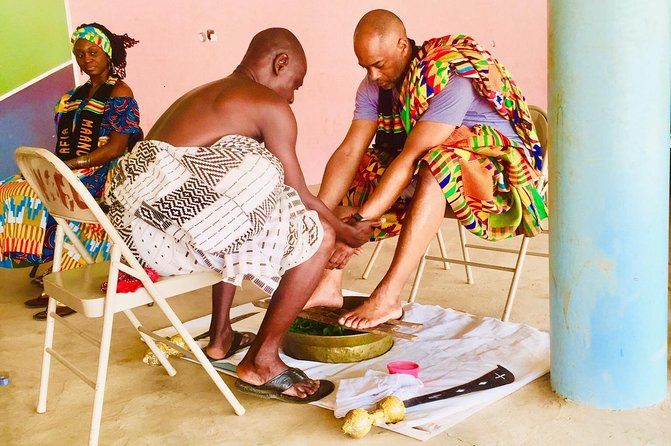
Following the visit to the cocoa farm, participants then enjoy the vibrant art of kente weaving, a centuries-old textile tradition deeply rooted in Ghanaian culture.
They’re welcomed into a local kente weaving workshop, where skilled artisans demonstrate the intricate process of creating these colorful, symbolic fabrics.
Participants have the opportunity to try their hand at weaving, learning the techniques and patterns that have been passed down through generations.
The workshop provides an in-depth look at the cultural significance of kente, its history, and the role it plays in Ghanaian life and identity.
It’s a captivating and immersive experience that truly showcases the rich artistic heritage of the region.
Historical Origins and Traditions
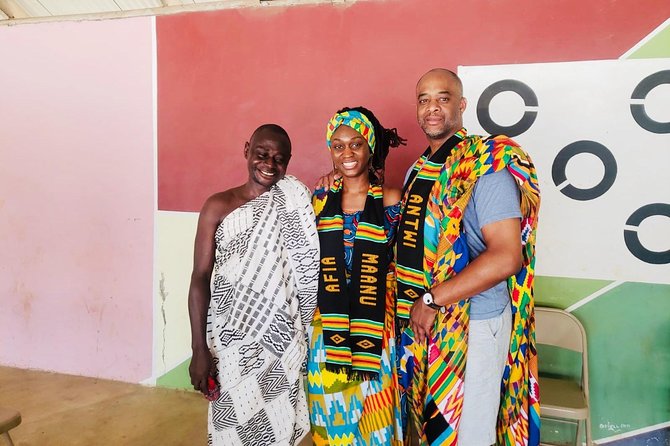
The traditional naming ceremony in Kumasi has deep historical roots, tracing back to the cultural traditions of the Ashanti people. Its origins lie in the belief that a child’s name holds profound significance, reflecting their unique qualities and the circumstances surrounding their birth.
The ceremony itself is steeped in symbolism, with the bestowing of a name serving as a rite of passage. Participants receive their names based on the day of the week they were born, with each day associated with specific qualities and meanings.
This tradition not only honors the child but also connects them to their ancestral heritage. The ceremony’s enduring legacy underscores the importance of preserving Ghanaian cultural practices within the African diaspora.
Logistical Details and Meeting Points
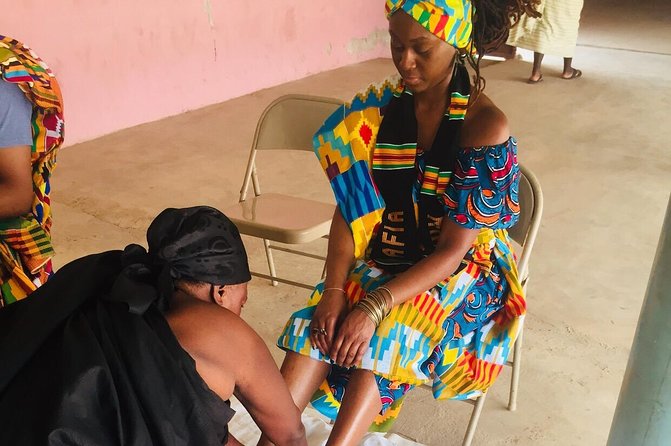
The traditional naming ceremony in Kumasi offers convenient meeting points for participants, with pickup options available to accommodate their needs. Visitors can join the experience at Bishop Oduro Sarpong Street in Nhyiaeso, Dakodwom Township, or at the Lancaster Kumasi City on Rain Tree Street, Lesley Opoku-Ware Drive.
The ceremony package includes various amenities to ensure a comfortable and enriching experience:
| Inclusions | Details |
|---|---|
| Transportation | Air-conditioned vehicle, fuel surcharge |
| Refreshments | Bottled water, lunch |
| Accessibility | Wheelchair-friendly, infant seats available |
| Booking | Confirmation at time of booking, free cancellation up to 24 hours prior |
The comprehensive package and meeting point flexibility make this traditional naming ceremony in Kumasi an accessible and convenient cultural experience for visitors.
Accessibility and Booking Confirmation
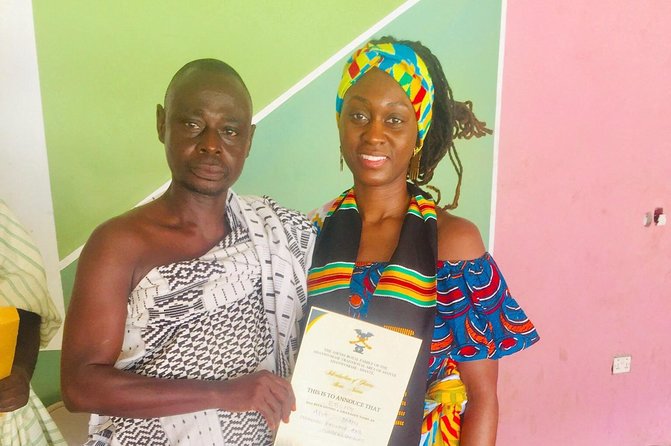
Is the traditional naming ceremony in Kumasi accessible to all travelers?
Indeed, the experience caters to diverse needs, providing wheelchair-accessible transportation and surfaces, as well as infant seats for those traveling with young children.
Plus, participants can count on receiving confirmation at the time of booking, ensuring a seamless planning process.
The organizers also offer free cancellation up to 24 hours before the start of the experience, providing travelers with added flexibility.
This commitment to accessibility and convenience underscores the organizers’ dedication to making the traditional naming ceremony in Kumasi an inclusive and enjoyable experience for all.
Traveler Testimonials and Feedback
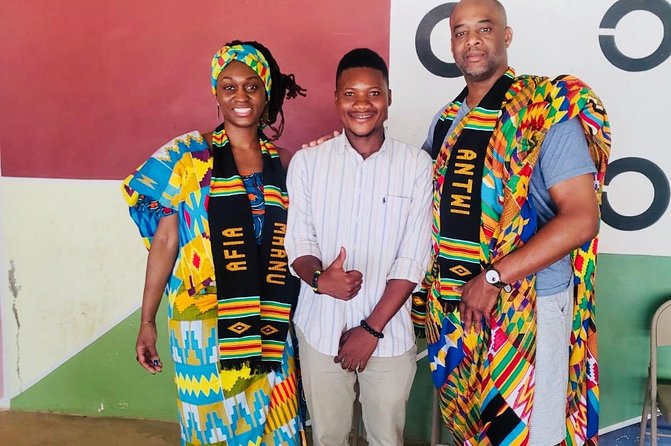
Travelers have overwhelmingly praised the traditional naming ceremony in Kumasi, leaving behind a perfect rating of 5.0 across 10 reviews. They highlight the emotional significance and unique cultural experience the ceremony provides, with several expressing intent to return and share the experience with family.
Participants have been particularly impressed by the guides, especially Bilson, and the warm, welcoming nature of the village community. One reviewer noted, ‘It’s not just a ceremony – it’s a whole culture that left me feeling connected to my roots.’
Another shared, ‘I can’t wait to bring my kids here to experience this tradition firsthand.’
Frequently Asked Questions
What Is the Average Duration of the Naming Ceremony Experience?
The average duration of the naming ceremony experience is not explicitly provided in the overview. However, the package includes a day-long itinerary with cultural activities, transportation, and meals, suggesting the typical experience lasts around 6-8 hours.
Is the Ceremony Only Open to Africans From the Diaspora?
The ceremony is not only open to Africans from the diaspora. According to the overview, private ceremonies are available for African-American and Caribbean diasporas with the Adawomase tribe in Kumasi, but the ceremony is a significant tradition in Ghanaian culture for all participants.
Can I Customize the Cultural Activities Included in the Package?
Yes, you can customize the cultural activities included in the package. The tour operator offers flexibility to tailor the experience based on your interests, such as visiting additional sites or participating in specialized workshops.
Are Professional Photography Services Available During the Ceremony?
Yes, professional photography services are available during the ceremony. The package includes a tour guiding service that can arrange for a photographer to capture the meaningful cultural experience for participants.
Do I Need to Bring Any Special Items or Materials for the Ceremony?
You don’t need to bring any special items or materials for the ceremony. The tour package includes all the necessary supplies and clothing. Just come prepared to fully learn about the cultural experience.
The Sum Up
The traditional naming ceremony in Kumasi offers African diasporas a profound connection to their cultural heritage.
From vibrant attire to immersive cultural practices, the ceremony celebrates a child’s arrival with deep reverence.
Participants leave with an emotional bond to their ancestral roots, cherishing the warmth and lasting impact of this remarkable experience.
It’s a testament to the enduring significance of Ghanaian identity and the power of cultural traditions.
